Family roles are essential in defining responsibilities and interactions within a household. They include nurturers, heroes, rescuers, scapegoats, enablers, and mascots, shaping dynamics and mutual support systems.
1.1 Understanding the Concept of Family Roles
Family roles are defined as the responsibilities and behaviors expected from each member within a household. These roles are often assigned based on factors like age, gender, and family structure. They shape how individuals interact, contribute, and relate to one another. Roles such as the nurturer, hero, or rescuer highlight the diverse ways family members support each other. Understanding these roles is crucial for recognizing how they influence family dynamics and individual development. While some roles promote harmony, others may lead to dysfunction if not balanced. Recognizing and adapting to these roles can foster healthier relationships and a more cohesive family unit.
1.2 Importance of Family Roles in Building a Strong Family Unit
Family roles are vital for creating structure and stability within a household. They ensure that responsibilities are shared, reducing conflict and fostering cooperation. Clear roles promote a sense of belonging and purpose, which strengthens emotional bonds. By fulfilling their roles, family members contribute to a supportive environment where each person feels valued. This collective effort enhances communication, trust, and mutual respect, laying the foundation for a resilient family unit. When roles are balanced and functional, they empower individuals to thrive, creating a harmonious and nurturing home life that benefits everyone involved and society at large.
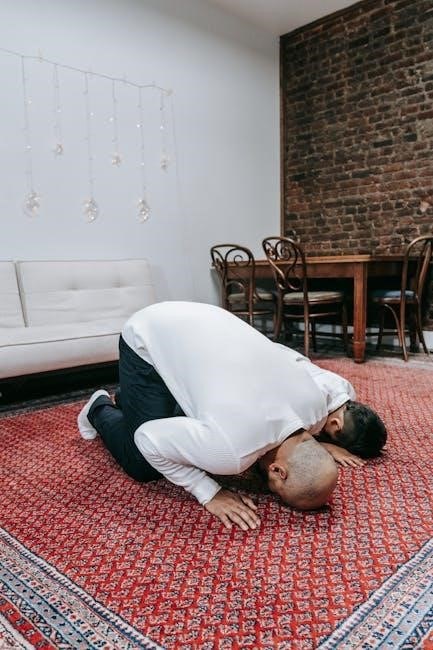
Functional Family Roles
Functional family roles include the nurturer, hero, and rescuer, promoting balance and support. These roles foster cooperation, emotional stability, and shared responsibilities, strengthening family bonds and unity.
2.1 The Nurturer: Parent, Caregiver, or Supportive Partner

The nurturer plays a vital role in providing emotional and physical care within the family. Often a parent, caregiver, or supportive partner, this individual ensures the well-being of others, fostering a sense of security and belonging. Their empathetic nature allows them to address the needs of family members, creating a supportive environment. In functional families, the nurturer’s role is interdependent, working alongside other roles to maintain harmony. This role is foundational, as it teaches children the importance of empathy and responsibility, shaping their personal development. The nurturer’s contributions are essential for building a resilient and loving family unit.
2.2 The Hero: The Responsible and Reliable Family Member

The hero is often the most responsible and reliable member of the family, typically taking on leadership roles and demonstrating trustworthiness. This role is commonly associated with the oldest child, who may assume duties such as organizing tasks, providing guidance, and setting a positive example. The hero’s reliability helps maintain order and stability within the family, fostering a sense of security for others. Their responsible nature often earns them respect and admiration, making them a key figure in decision-making processes. This role is crucial in functional families, as it promotes accountability and responsibility, which are essential for the family’s overall well-being and cohesion.
2;3 The Rescuer: Problem-Solver and Emotional Support Provider
The rescuer is a compassionate and proactive family member who excels at solving problems and providing emotional support. This role often involves mediating conflicts, offering advice, and helping others navigate challenges. Rescuers are empathetic and skilled at understanding the emotional needs of their family, making them a vital source of comfort and reassurance. Their ability to remain calm and composed during crises allows them to effectively address issues, fostering a sense of security and harmony within the family. The rescuer’s role is essential in maintaining emotional balance and ensuring that family members feel supported and cared for during difficult times.
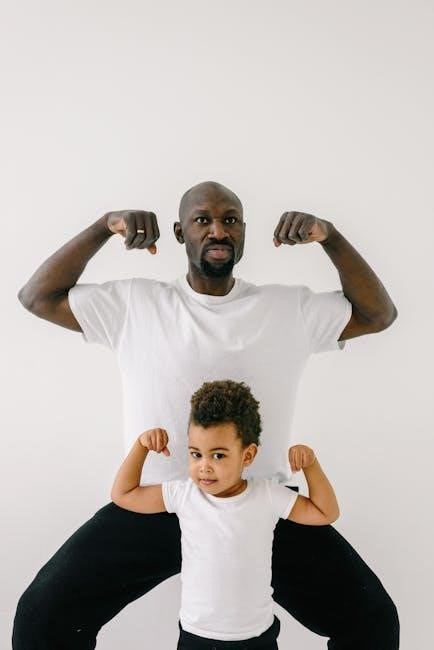
Dysfunctional Family Roles
Dysfunctional family roles create imbalance and codependency, often leading to emotional and psychological strain. These roles, such as scapegoats or enablers, disrupt harmony and hinder healthy development within families.
3.1 The Scapegoat: The Family Member Who Bears the Blame
The scapegoat is a common role in dysfunctional families, where one member is unfairly blamed for the family’s problems. This individual often becomes the target of criticism, anger, or resentment, which can lead to emotional distress and low self-esteem. The scapegoat role can be assigned due to various reasons, such as being the most vulnerable or different from others. This dynamic perpetuates dysfunction as it distracts from the real issues within the family. Over time, the scapegoat may internalize the blame, affecting their personal development and relationships outside the family. Recognition of this role is crucial for breaking the cycle of dysfunction.
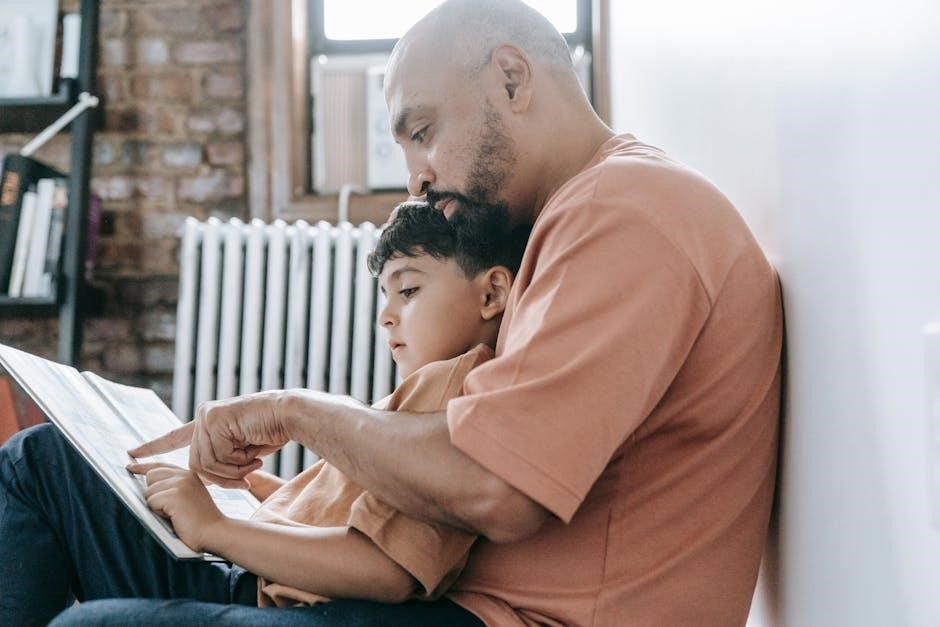
3.2 The Enabler: The One Who Unintentionally Perpetuates Dysfunction
The enabler is a family member who, often unintentionally, supports and perpetuates dysfunctional behaviors. This role involves covering up or justifying harmful actions, such as addiction or neglect, to maintain a false sense of normalcy. Enablers may feel responsible for others’ well-being or fear conflict, leading them to avoid addressing issues directly. Over time, this behavior prevents the family from confronting and resolving problems, allowing dysfunction to persist. The enabler’s actions, though well-intentioned, can lead to burnout and resentment while enabling harmful patterns to continue unchecked. Recognizing this role is key to addressing and breaking cycles of dysfunction within the family system.
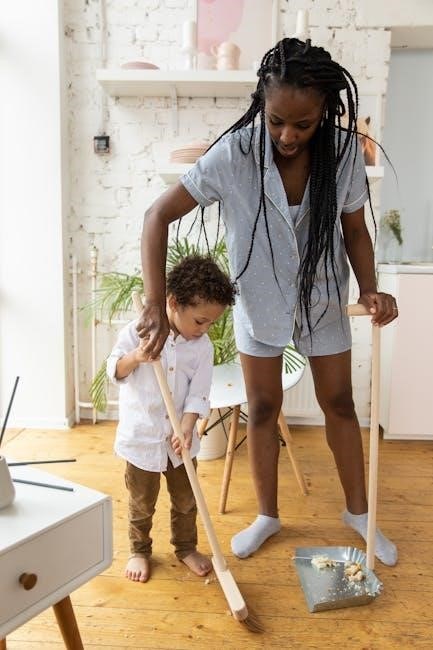
3.3 The Mascot: The Family Clown or Peacekeeper
The mascot is the family member who often acts as the clown or peacekeeper, using humor or light-hearted behavior to diffuse tension. This role involves maintaining harmony by avoiding conflict and keeping the atmosphere positive. Mascots may suppress their own emotions or concerns to ensure others feel comfortable or happy. While their intent is to bring joy and balance, they may unintentionally avoid addressing serious issues or neglect their own emotional needs. Over time, this can lead to feelings of resentment or inadequacy, as their role may prevent authentic communication and contribute to unresolved family dynamics. The mascot’s behavior, though well-meaning, can inhibit personal growth and genuine connection within the family.

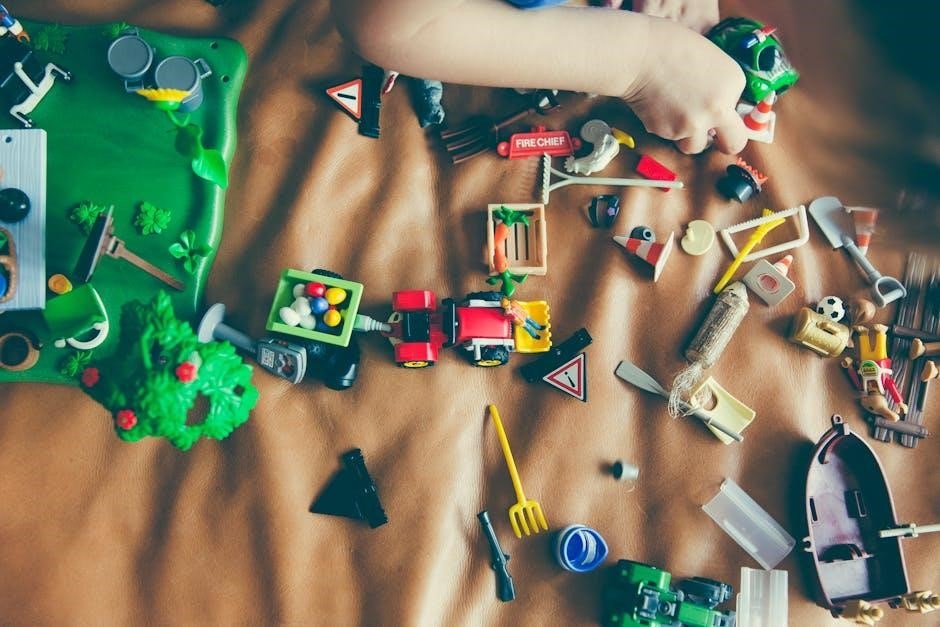
The Impact of Family Roles on Individuals and Society
Family roles significantly influence personal development and societal structure. They provide support, define responsibilities, and foster stability, impacting individual growth and societal harmony.
4.1 How Family Roles Shape Personal Development
Family roles play a crucial role in shaping personal development by defining responsibilities and expectations. Each role, such as nurturer, hero, or rescuer, influences an individual’s self-perception, skills, and emotional well-being. For instance, a child assuming the hero role may develop strong organizational and leadership abilities, while a nurturer may cultivate empathy and emotional intelligence. These roles often establish life-long patterns of behavior and coping mechanisms, impacting how individuals interact in future relationships and societal settings. Understanding these dynamics is essential for fostering healthy development and addressing potential challenges that arise from rigid or dysfunctional role assignments.
4.2 The Role of Family in Providing Structure and Stability to Society
Families serve as the foundation of societal structure by teaching roles, responsibilities, and values that shape individual behavior. They foster respect for elders, cooperation, and empathy, which are essential for societal harmony. Stable families reduce the likelihood of societal problems like crime and mental health issues by providing emotional support and guidance. The structure and stability families offer help individuals develop into responsible citizens, contributing positively to society. By instilling a sense of belonging and shared values, families play a critical role in maintaining social cohesion and promoting collective well-being. Strong family structures are vital for the overall health and stability of society.

Redefining Family Roles in Modern Society
Modern society emphasizes equality and flexibility in family roles, moving away from traditional gender-based responsibilities. This shift promotes shared duties, personal growth, and mutual satisfaction among all members.
5.1 Breaking Free from Traditional Gender Roles
Modern families are increasingly moving beyond traditional gender roles, embracing equality and shared responsibilities. This shift fosters mutual respect and collaboration, allowing individuals to thrive without societal constraints. By breaking free from rigid expectations, families can distribute tasks based on personal strengths and preferences rather than gender. This evolution promotes a more balanced and equitable home environment, where both partners contribute equally to caregiving and financial responsibilities. As a result, children grow up with healthier role models, understanding that capabilities are not limited by gender. This transformation strengthens family bonds and paves the way for a more inclusive and harmonious society.
5.2 Encouraging Equal Responsibilities Among Family Members
Equal responsibilities within families promote harmony and fairness, ensuring all members contribute according to their abilities. This approach fosters a sense of ownership and accountability, reducing burden on individuals. By distributing tasks evenly, families can achieve a balanced lifestyle where each person feels valued. Open communication and mutual respect are key to implementing this system. It also teaches children the importance of teamwork and responsibility, preparing them for future challenges. Equal responsibilities strengthen family bonds and create a supportive environment, leading to greater overall satisfaction and well-being for everyone involved.
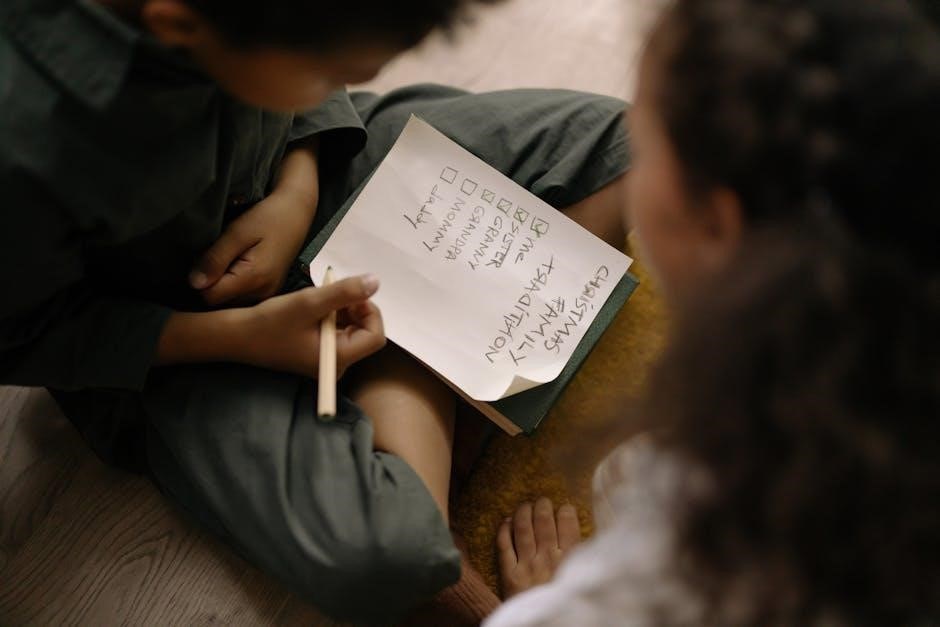


About the author